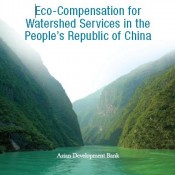China Uses Eco-Compensation
to Combat Water Shortages
As China expands economically, one of the largest resource constraints is clean drinking water, a problem being addressed in part by “eco-compensation.” Now the central government is developing a nation Eco-Compensation ordinance. A new paper out today details recommendations on what this new ordinance should look like.

25 November 2011 | As the People’s Republic of China (PRC) continues to expand economically, access to clean drinking water is an increasing problem. For one in seven Chinese, drinking water does not meet national pollution standards—and 300 million rural Chinese simply lack access to safe drinking access.
The country is already spending 2.3% of its gross domestic product to address the problem, according to an estimate by the World Bank. The spending is split between addressing the issues around freshwater scarcity and combating the direct impacts of water pollution.
To keep that cost from growing, the central and provincial governments are currently researching new ideas and methods for improving management of water resources. Included in that is experimentation at every level of management with “eco-compensation” methods—a method that shares similarities with the more familiar “payment for ecological service” schemes. The widespread use of eco-compensation has prompted the central government’s National Development and Reform Commission (NDRC) to develop a national Eco-Compensation ordinance.
According to the authors of a new paper published by the Asian Development Bank, “Eco-Compensation for Watershed Services in the People’s Republic of China,” the success of this ordinance and other innovations will have ramifications for global resources as well as PRC’s domestic water crisis. The authors, Michael T. Bennett and Qingfeng Zhang, provide detailed recommendations for developing an effective national ordinance along with background on the use of eco-compensation within PRC and the recent innovations around water resource management.
The implementation of a national ordinance will have to overcome some institutional challenges, according to the authors. Central to that is the fact that management of water—a state-owned resource—is spread throughout multiple agencies, leading to water management that is “fragmented, uncoordinated (both horizontally and vertically), and lacking in sufficient legal structure and foundation.”
In addition to this challenge, the paper says that because national and provincial rules address eco-compensation, the incoming ordinance will have to complement these rules as well as the ability to evolve with and influence any environmental management system reforms in the PRC.
Focusing on the water aspect of the Eco-Compensation Ordinance, Bennett and Zhang developed three recommendations.
First, they say that eco-compensation should be utilized in the development of integrated river basin management. Though this could be a challenge, according to the authors, there are many opportunities for utilizing eco-compensation and it could serve as a platform for bringing together the disparate parts of the current watershed protection.
Secondly, there is a need for flexibility within the ordinance to allow for innovative local-level solutions to the unique challenges that each watershed poses. Instead of strict frameworks, the authors think that the ordinance should focus on outcomes, such as protection, restoration and improvement of key ecological service flows and environmental resources. This, according to Bennett and Zhang, will also allow these local groups to better target funding.
Third, Bennett and Zhang emphasize that the ordinance must properly take into account the scale of the different actors involved in water resource management. For example, as they point out, different stakeholder’s property rights and responsibilities over specific ecological service flows will determine the feasibility of developing eco-compensation schemes.
The authors also reiterate in this recommendation the need for delineating water resource rights and management, saying that the ordinance needs to anticipate and facilitate these changes.
Though the fate of eco-compensation will ultimately come down to if benefits outweigh the costs, there is already a strong foundation for the development of a national eco-compensation ordinance. As this paper states, the water crisis in PRC will not disappear without all stakeholders working together to address watershed management and pollution issues.
Additional resources
Please see our Reprint Guidelines for details on republishing our articles.

